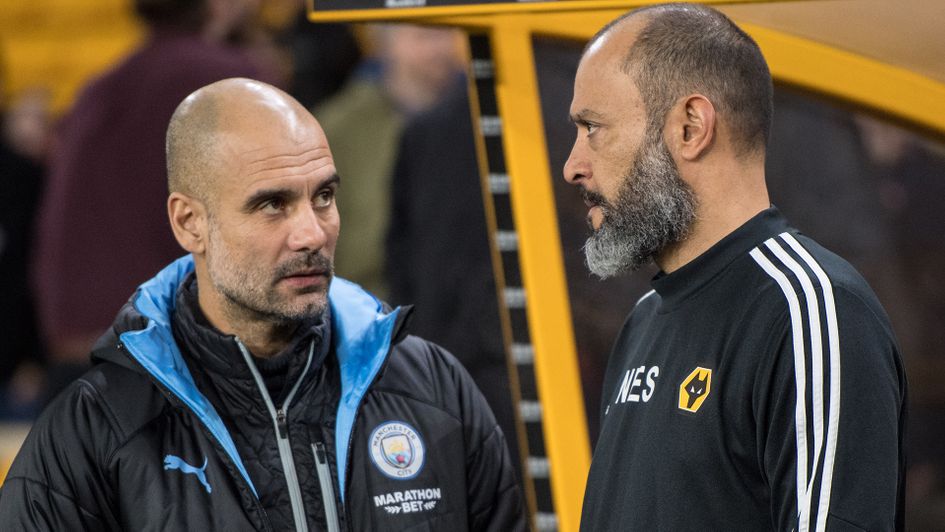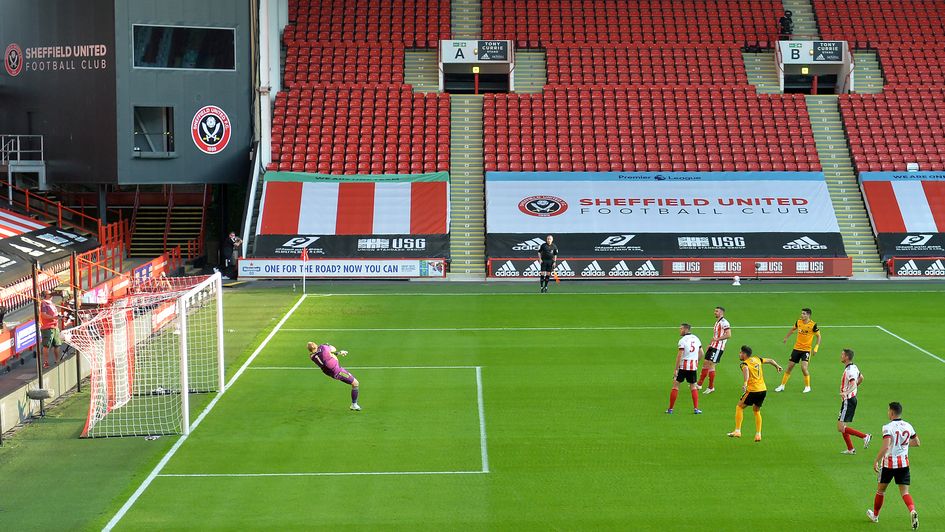 Fast Results
Fast Results Scores
Scores Racecards
Racecards 
Wolves v Manchester City: Will Nuno Espirito Santo beat Pep Guardiola again?
While Manchester City did an unprecedented treble in 2018-19, Wolves did a rare double last season.
Nuno Espirito Santo became just the second manager, after Antonio Conte, to record home and away league wins over Pep Guardiola in the same season, though Ole Gunnar Solskjaer soon joined a select band. Eden Hazard, Adama Traore and Anthony Martial form a trio to have scored in both league victories over a Guardiola team in a campaign.
So perhaps Monday’s trip to Molineux represents one of the toughest possible starts to City’s attempt to reclaim the title. Excluding penalty shootouts, Guardiola only has a losing record against two managers he has faced at least five times: Jurgen Klopp and Nuno. Wolves were the first team to take points off City two seasons ago in a 1-1 draw at Molineux. They drew at the Etihad Stadium in the Carabao Cup as a Sky Bet Championship team; with better finishing, they might have won, even if they were beaten in the resulting shootout.
Wolves have a further record: they registered the highest share of possession against a Guardiola team in the Catalan’s time in management. That 62.2 percentage in December’s 3-2 win at Molineux was deceptive in one respect, as City had Ederson sent off after 12 minutes. Their previous victory came with just 24.0 percent and the 1-1 draw with 28.9 percent. It is safe to say Nuno’s plan now will again be to contain and counter.
Wolves excelled at both parts of that last season. City only mustered five shots on target in 180 minutes against them last season, even if asterisks may be applied as the injured Kevin de Bruyne missed the meeting in Manchester and Sergio Aguero was sacrificed after Ederson’s sending off in Wolverhampton.
Yet there is a theme. Wolves finished games against Arsenal (twice), Chelsea, Tottenham, Liverpool and Manchester United in 2018-19 and United, City, Liverpool and Chelsea last season with their illustrious opponents having three or fewer shots on target.
They had under 40 percent of possession in each of those games; they specialise in soaking up pressure without requiring Rui Patricio to intervene too often. Collectively, their outfield players blocked 10 shots. Willy Boly made 12 clearances (by way of comparison, no Wolves player made more than one in the rematch against 10 men) and Ruben Neves recovered the ball 11 times. Wolves’ solidity in the centre of the pitch, with three centre-backs and three central midfielders offering a policy of safety in numbers, forced City wide; they had 26 crosses.

While Nuno alternates between 3-4-3 and 3-5-2, there is a case for using the latter to give a third central midfielder to block City’s path to the penalty area. In attack, the contrasting figures of Traore and Raul Jimenez illustrated last season that they have the potential to be pivotal.
Traore can present a paradox, a player who scored three league goals against City and one against everyone else last season and who got two goals from as many shots at the Etihad and two in 41 in the remainder of the campaign, but the recurring theme of Guardiola’s setbacks in the last 18 months is that his team are susceptible to counter-attacks from fast forwards, especially when Fernandinho is not anchoring the midfield. The importance of the Brazilian to halt breaks suggests he should start in his old role.
Traore began at wing-back at the Etihad Stadium last year, just as he did at Sheffield United on Monday. In each case, he moved into the attack after substitutions. Both his goals in Manchester stemmed from Jimenez through passes when City were dispossessed, the Mexican led a direct break and Wolves were two against two; his strike at Molineux came when City backed off and he drilled in a shot from 25 yards.

Jimenez’s capacity to link up with the runners was apparent in Matt Doherty’s winner in that match. At the Etihad, in particular, Wolves’ chances often stemmed from poor City passes, which Wolves latched on to. Traore’s goal in Manchester came from Joao Cancelo losing possession, and Jimenez’s in Wolverhampton from Benjamin Mendy being dispossessed.
More than any type of player, fast wingers tend to be City’s undoing. They have had problems against Pierre-Emerick Aubameyang, Heung-min Son, Steven Bergwijn, Wilfried Zaha, Sadio Mane and Mohamed Salah in recent seasons. Each can exploit the room attacking full-backs leave behind. Each has the speed to mean that, coupled with a direct approach, the City wingers trapped upfield are in effect out of the game.
City can argue that Aymeric Laporte played in neither defeat to Wolves last season, so there is scope for improvement at the back. The summer signing Nathan Ake also has the potential to be an antidote to Nicolas Otamendi, who went to ground recklessly and unsuccessfully for October’s opening goal. And defensive absentees can have a significance in these meetings. Guardiola’s solitary win over Nuno came when Wolves were depleted for 71 minutes by Boly’s red card.
City were already leading, but they are yet to defeat the 11 men of Nuno’s Wolves. Until Monday?